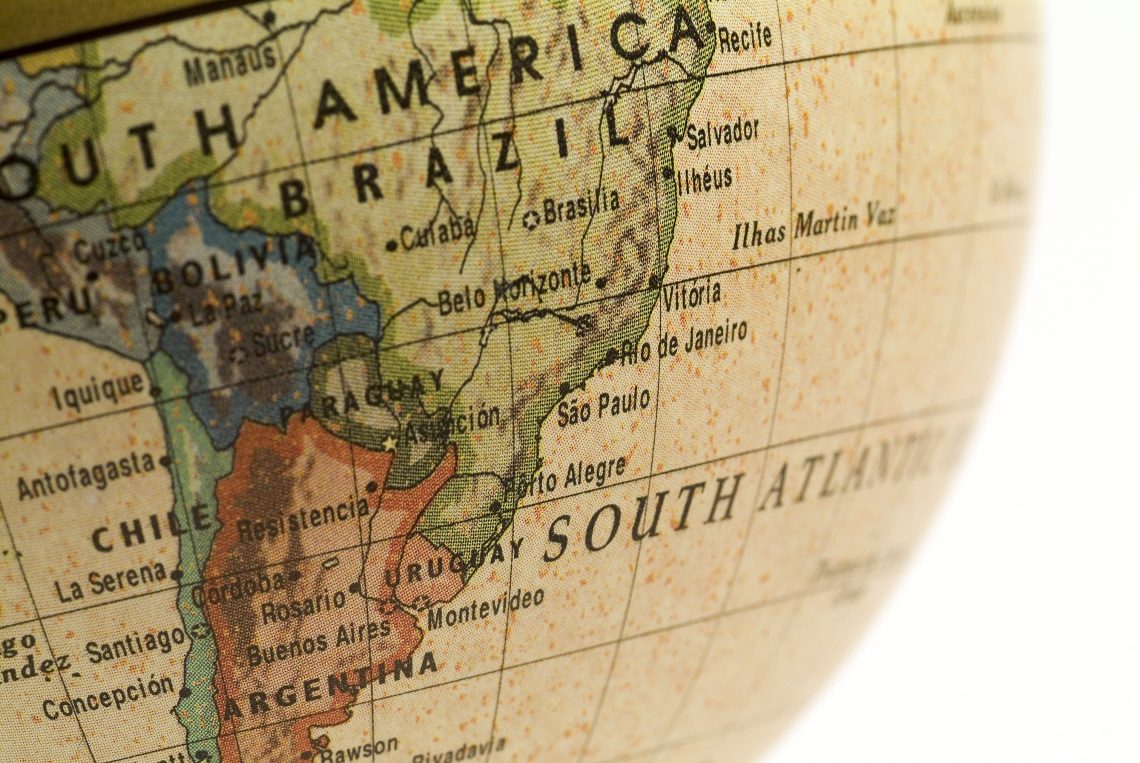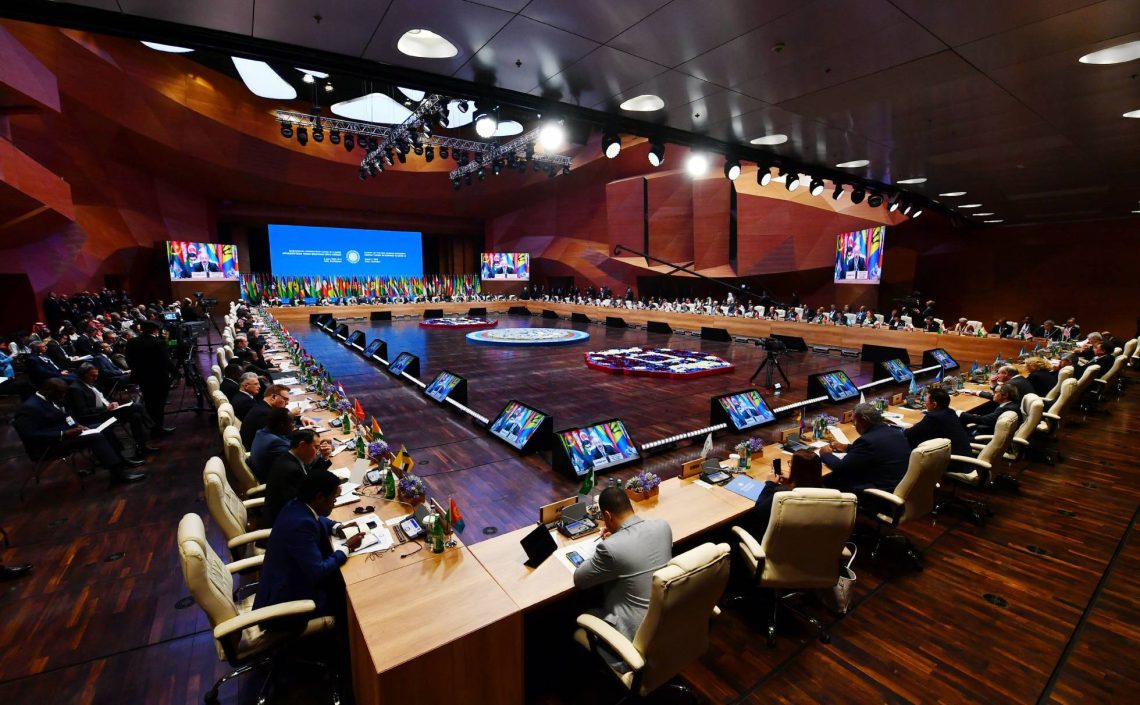The United States’ approach to the Global South https://t.co/81TT1SKjWf
— Michael Novakhov (@mikenov) December 11, 2023
Day: December 11, 2023
The vast grouping of less-developed nations is experiencing a revival today. India, China and Russia are generally more engaged with them than the United States and Europe.
 Many nations of Latin America, Asia, Africa and Oceania are considered to be part of the Global South. © Getty Images
Many nations of Latin America, Asia, Africa and Oceania are considered to be part of the Global South. © Getty Images
- Russia’s influence over the nominally nonaligned nations remains from the Cold War
- China and India consider themselves leaders and members of the Global South
- The U.S. will likely pursue less active diplomacy unless vital interests are at stake
The Global South refers broadly to nations in Latin America, Africa, Asia and Oceania that are less developed than richer, mostly northern, countries.
It is also considered a geopolitical alignment, with associations such as BRICS (Brazil, Russia, India, China and South Africa) formed as alternative structures to groups such as the British Commonwealth, European Union, G7 and G20, or the Russian-led Commonwealth of Independent States.
Many of these countries have a legacy of oppression under colonialism, racism and imperialism. They lack the benefits of more industrialized nations and some of them claim they are suffering the brunt of global warming. In the United States, the Global South commands greater attention but little consensus over policy.
In part, the concept draws from the legacy of the nonaligned movement during the Cold War. In retrospect, the movement was anything but nonaligned. Moscow supported the idea and used it as a tool for expanding its influence and marginalizing the West, all under the false flag of neutrality and sympathy for the developing world. In practice, even nations that committed to the movement as foundational to their foreign relations did plenty of aligning, out of necessity. The Soviet Union encouraged the themes of combating the legacies of imperialism and colonialism.
The term Global South became commonly used, particularly in the latter stages of the Cold War.
While the nonaligned movement was rooted in the power struggles of great power competition, the Soviets also sought to infuse Marxist-Leninist ideology. Many nonaligned nations, for instance, took advantage of the opportunities to send their children and professionals to Moscow for undergraduate, graduate and postdoctoral education and technical training. National elites for decades were trained in the Soviet system.
Post-1989, the movement largely drifted into irrelevance, reflecting the fact that much of the energy keeping it going came from the Soviet bloc. But it did not disappear. Generations of politicians, professionals and academics were suffused in the ideas and the teachings of the movement. Most notable was India, whose nonalignment policy and stubbornly pro-Russian stance persisted for decades.
While the Global South has historical roots, its revival reflects contemporary geopolitics. Hence the debate in the West about whether to view the movement through its historical foundations or interpret as a fresh development.
The West still misunderstands the Global South
In another major challenge for Washington, several major powers have significant interest and activity in the Global South. None of them directly align with the U.S.
China. Beijing has made engaging with these nations as integral to its soft-power diplomacy. China fashions itself as part of the group. “China is identifying itself as a member of the Global South family,” argues Dr. Lina Benabdallah, an assistant professor of politics and international affairs at Wake Forest University. “This makes them more appealing to countries in the Global South, as well as a model for countries aspiring to be great nations.”
Beijing routinely asserts that the country should be considered a developing nation in international organizations and treaties. China uses its status as a developing country to benefit from provisions and special treatment in treaties and international organizations intended to help poor nations.
China has also reinvigorated the Marxist constructs of the nonalignment movement asserting that the West is imperialist and exploitive of developing nations. China’s agenda pairs well with Beijing’s interest in developing economic, diplomatic and political relationships with countries in the Indo-Pacific, Africa and Latin America. China routinely asserts solidarity with the developing nations, often attempting to challenge, supplant or undermine other powers.
Russia. Moscow has long had a policy of engaging countries in Africa and Latin America. Russian influence in the Global South is clearly reflected in policies responding to Moscow’s war against Ukraine. Many nations in the Global South adopt positions sympathetic to Russia. In part, these policies reflect not just pro-Russian stances, but complaints about “hypocrisy” in the West lavishing assistance on Ukraine and attention to the needs of its refugees and demonstrating far less generosity to similar crises in developing nations.
Russia routinely uses its influence in Latin America and Africa to undermine U.S. interests, such as supporting authoritarian regimes like Venezuela.
India. New Delhi has made outreach foundational to its foreign policy. For example, it has highlighted engagement with the Global South during its turn in the G20 presidency. This may reflect India’s history as a leader in the nonaligned movement. Still, much more is at play. India in some respects still sees itself as a developing nation, sharing solidarity with countries that face similar challenges of “food, fertilizer and fuel security.” India also sees itself as a bridge between the developed and developing worlds.
Finally, India sees these nations as a field to gain influence in its rivalry with China in developing countries, the broader Indo-Pacific and global institutions.
While India is developing much stronger bilateral ties with the U.S., particularly in countering China, Global South diplomacy is mostly firewalled from aligning with Washington. New Delhi emphasizes its role in the Global South to remind that it is not aligned with any great power.
Europe. The European Union, and several European states including France, Italy and Spain, see outreach and cooperation with parts of the Global South as part of their historical legacy, cultural affinity and geopolitical interests. Spain, for example, actively engages with Latin America. Both France and Italy are active in North Africa.
Europeans do not have a comprehensive or integrated response or engagement in the Global South. While they sometimes cooperate with the U.S. in these areas, their activities are largely viewed as independent prerogatives outside the context of transatlantic relations.
 Azerbaijani President Ilham Aliyev delivers a speech during the Summit of Non-Aligned Movement Contact Group in Baku, Azerbaijan, on March 2, 2023. © Getty Images
Azerbaijani President Ilham Aliyev delivers a speech during the Summit of Non-Aligned Movement Contact Group in Baku, Azerbaijan, on March 2, 2023. © Getty Images
There are several issues that also complicate American policies.
Climate. Environment and energy are issues of common concern across the Global South. Yet, engagement on this issue is complicated in two ways. On the one hand, developing nations believe they suffer most from the consequences of climate change while developed nations are responsible for most of the emissions and should pay for most of the mitigation. On the other, the West supports and insists on rapid transformation to green technologies, which are often too expensive and unsuited to developing nations that lack widespread availability of abundant, reliable and affordable electricity. The imposition of Western solutions on developing nations grates as another form of external imperialism.
De-dollarization. Another challenge for Washington is the growing campaign to establish alternatives to the U.S. dollar as a global reserve currency. This would reduce the U.S.’s role and influence in international trade and foreign direct investments, as well degrade the influence of U.S. sanctions. Among both BRICS and Global South nations, this has been championed by countries like Brazil and South Africa, encouraged by China and Russia.
History and race. Although the U.S. does not have the expansive legacy of European imperialist powers, Americans do have a history of slavery and racism. During the Cold War and post-Cold War, Washington has been accused of meddling in the sovereignty of developing nations and imposing political, economic and cultural influences. This past is used to question the intentions and legitimacy of U.S. engagement in the Global South.
The most likely scenario is that the U.S. will not develop a comprehensive response or engagement strategy for the Global South.
Vital Interests. U.S. foreign policy under Republicans or Democrats tends to be dominated by vital geopolitical interests. The U.S. response in Ukraine, for instance, was disproportionate to other conflicts, not because of racism, but because stability in Europe is among the top vital U.S. interests. The Global South as an entity is not a vital U.S. interest. By the same token, many of the individual nations in the Global South are not core to U.S. interests.
Strategy. No matter how the U.S. defines a Global South policy, it will be shaped by inherent contradictions. The U.S. cannot legitimately claim solidarity with the Global South. Any effort to comprehensively address the Global South would appear patronizing (distasteful in those countries or contrite and repentant – controversial in the U.S.). Nor can the U.S. attempt to delegitimize the concept of the Global South as beholden to Russia or China. This challenges the agency of the member nations and triggers resentment. Since America’s close partner India champions the Global South and is seeking a leadership role, such a strategy would both undermine and antagonize a key U.S. strategic partner.
Economics. Direct economic competition with the developing world to combat de-dollarization would likely trigger unintended and potentially debilitating economic disruption. The key factors that the U.S. controls are the strength of the U.S. dollar through decisions made on debt, economic growth and trade policy – not a policy toward the Global South per se.
Energy. Republicans and Democrats endorse virtually opposite policies on climate. The American left favor a rapid transition to green energy and major investments in global mitigation. In contrast, the American right is less interested in underwriting global mitigation and far more supportive of an “all of the above” approach to energy development, including traditional fossil fuels and nuclear power. Therefore, a consistent, coherent partnership with the Global South is unlikely.
Alliances. If a Global South policy could be framed as an “anti-Russia and China” policy, Washington might be able to forge a united approach with friends and allies. In the near term that appears unlikely. There is no consensus on a global response.
International organizations. Due to their large number, it would not be in the U.S.’s interests to see the Global South voting as a coherent bloc in international organizations, particularly under the leadership of China. This development would be disadvantageous to the U.S. and other powers. The U.S. is also likely to invest more in groupings such as the G7, the Quad and NATO as instruments to influence global leadership.
Given these significant challenges, the U.S. is unlikely to develop any general response to the Global South beyond palliative rhetoric. More likely is that the U.S. will largely eschew engaging the Global South as a coherent body. Rather, the U.S. will continue to engage with regions, addressing the concerns and challenges through a variety of economic, security, energy, diplomatic, political and foreign assistance strategies. The U.S. is more likely to address the underlying challenges such as de-dollarization and competition with China and Russia through mechanisms other than the Global South structure.

Receive insights from our experts every week in your inbox.
The Global South vs US – Google Search https://t.co/5ovEwLmnml pic.twitter.com/GMOJlNbs0d
— Michael Novakhov (@mikenov) December 11, 2023
With just four working days left before its holiday recess, the U.S. Congress is no closer to passing the White House’s $60 billion request for aid to Ukraine.
Lawmakers are running out of time to negotiate a deal on border security that Republicans say must be included to overcome their concerns about funding foreign conflicts while leaving domestic priorities unaddressed.
“This is about securing our border so we can then help our allies,” Republican Senator Lindsey Graham told reporters Thursday.
Watch related video by Patsy Widakuswara:
Graham called on President Joe Biden to enforce existing immigration laws, saying he would not return to his home state of South Carolina to “try to explain why I helped Ukraine, Taiwan and Israel and did nothing to secure our own border. I will help all of our allies, but we have got to help ourselves first.”
The Ukraine aid request is part of a larger $106 billion emergency supplemental request that includes military assistance to Israel and Indo-Pacific partners as well as Democratic priorities for border security funding.
“Republicans in Congress are willing to give Putin a gift, the greatest gift that Putin could … hope for,” White House press secretary Karine Jean-Pierre told reporters Thursday.

Migrants seeking asylum wait to be processed by the U.S. Border Patrol after having crossed the Rio Grande River from Ciudad Juarez, Mexico, on Dec. 5, 2023.
Senators resumed negotiations Thursday after failing to open debate on the supplemental request by a 49-51 vote late Wednesday.
“I think the vote yesterday convinced them [Democrats] that we are serious about it, and something needs to be done,” Senator Jim Risch, the top Republican on the Senate Foreign Relations Committee, told VOA. “And I’m convinced that we’ll get there. That’s just democracy.”
Democrats object to Republicans’ proposals to change asylum rules at the U.S. border and argue the White House request must be considered all together as part of a broader national security strategy.
“It was Republicans who threw an unnecessary wrench into Ukraine funding by tying it to the extraneous issue of the border,” Senate Majority Leader Chuck Schumer said on the Senate floor Thursday.
“We all agree that border security is important,” he said. “President Biden included strong border provisions in the proposal he sent us. But we also know it’s a complicated issue — very complex — that’s escaped bipartisan solution for years.”
Earlier this week, Ukrainian President Volodymyr Zelenskyy had been expected to address a classified briefing for U.S. senators via videoconference but canceled unexpectedly. The meeting ultimately grew tense as Republicans accused Democrats and Biden administration briefers of not addressing their concerns about the border.
Senate Minority Leader Mitch McConnell, a strong supporter of aid to Ukraine, emphasized Thursday that Republican border security proposals must be included to win Republican votes.
“It is profoundly unserious to pretend that national security priorities don’t include securing our nation’s borders,” McConnell said on the Senate floor Thursday.
“To warn about borders in jeopardy and not start with the one that’s being overrun here at home,” he said. “To invoke threats facing sovereign nations without a clear plan to uphold America’s own sovereignty.”
Brigadier General Pat Ryder, the Pentagon press secretary, said Tuesday that there is $1.1 billion left to replenish U.S. military stockpiles for weapons and equipment sent to Ukraine.
The White House also warned earlier this week that the United States has about $4.8 billion left to supply Ukraine with aid, an amount that would run out by the end of this year.
Any compromise passed in the Democratic-majority Senate would also need to pass the Republican-majority House of Representatives, where support for Ukraine has diminished this year.
House Speaker Mike Johnson has indicated he does not plan to extend the House schedule past its last scheduled day in session on December 14. Earlier this week, he told reporters several key questions about accountability and the longer-term strategy for victory in Ukraine remain.

A man inspects damage at an oil depot hit by recent shelling in the course of the Russia-Ukraine war in Donetsk, Russian-controlled Ukraine, on Dec. 7, 2023.
Many Republicans recognize that aid to Ukraine is important for deterrence but argue for more oversight.
Republican Representative Michelle Steel told VOA on Thursday, “We’ve been spending so much — billions and billions of dollars. We have to see transparency, that exactly where these monies are going and how they’re spending it.”
According to the Kiel Institute for the World Economy, aid commitments to Ukraine are at their lowest since the beginning of the war in February 2022.
“Between August and October 2023 saw a stark drop in the amount of newly committed aid, with the value of new packages totaling just EUR 2.11 billion,” the report said.
Biden has worked to shore up the support of allies amid uncertainty over passage of the funding on Capitol Hill.
“Great Britain and the European countries will keep on supporting Ukraine,” David Cameron, British foreign secretary and former prime minister, told VOA.
“But clearly America is an essential partner in this,” he said. “They are the world’s biggest economy, the biggest defense player, absolutely vital. So, let’s keep going on making the argument about what a difference the resources will make.”
aid for ukraine and funding for southern border – Google Search https://t.co/JxnD7KfUVv
— Michael Novakhov (@mikenov) December 11, 2023
I also held a bilateral meeting with @JMilei.
Today, the streets and squares of Buenos Aires are filled with the word “freedom”, “libertad”.
Freedom is what unites us, Ukraine and Argentina. We truly cherish it, protect it, and stand ready to strengthen it together.
🇺🇦🇦🇷 pic.twitter.com/u0I8F1x1Qm
— Volodymyr Zelenskyy / Володимир Зеленський (@ZelenskyyUa) December 10, 2023
All American citizens who support Ukraine, face it!
The purportedly moderate republican Senators gave in to Putin’s Trump this week & sold out Ukraine, offering no military, humanitarian or financial support for 2024.
What do you call such people? Deceitful or traitors?— Anders Åslund (@anders_aslund) December 11, 2023
Соратники Навального шесть дней не могут связаться с политиком и не знают, что с ним происходит. Алексея Навального снова не вывели по видеосвязи в суд, сообщила его пресс-секретарь Кира Ярмыш. По ее словам, представители колонии утверждают, что с 7 декабря “не могут починить… pic.twitter.com/GyiZdORDiO
— DW на русском (@dw_russian) December 11, 2023
Правительство Великобритании создаёт новое ведомство, которое займется борьбой с обходом санкций, введённых против России в ответ на её военное вторжение в Украину. https://t.co/KnhLLRsCDq
— Радио Свобода (@SvobodaRadio) December 11, 2023


